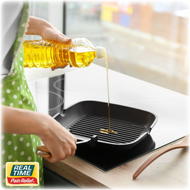How Cooking Oils Affect Inflammation
21st Apr 2021
Oils in History
Oils have been used in cooking throughout history. The most readily available oils for cooking in ancient times were animal fats like pig’s lard and tallow, which is the fat that surrounds a cow’s kidneys. These were rendered down and used in cooking. Eventually people developed the ability to extract oils from other things like plants and seeds. This gave way to people using oils such as olive oil, canola oil, sunflower oil, coconut oil, and avocado oil.
It has more recently been discovered, however, that not all oils are created equally. Some oils can cause major health issues for people with chronic pain or inflammation from conditions such as Gout, Fibromyalgia, Lupus, Chronic Fatigue Syndrome, back pain, or Arthritis. It is critically important to select the right oil for your dishes, whether you are using the oil for cooking or using it to make a dressing or sauce.
Which Oils Are Beneficial and How Are They Used?
All oils have a value attached to them and it is called the ‘smoke point’. This is the point at which the oil will burn while cooking. It is important to remember the smoke point of the oil you are using before selecting it to cook at a high heat or to make a salad dressing. We have listed some healthy examples below.
The oils listed below are healthy because they have higher concentrations of Omega 3s than they have of Omega 6s. You always want to consume more Omega 3s than you do Omega 6s and keep your intake of Omega 6 very low. It is Omega 6 that can cause inflammation in the body, and this inflammation can aggravate certain conditions, as well as cause pain in various parts of the body. The damage that Omega 6 can do your body will remove any benefits you receive from eating the healthier Omega 3s. It is crucial to keep your intake of harmful Omega 6 very low.
Healthy oils with a high smoke point and which are good to use for high-heat cooking include:
- Pig’s lard
- Tallow from cows
- Avocado oil
- Coconut oil
- Palm oil
- Almond oil
- Ghee (which is made from butter.)
Avocado oil is by far the best oil for sautéing food at a high temperature since it has one of the highest smoke points at around 540 degrees. It is also a good, clean, neutral tasting oil that is not processed with any nasty chemicals. It can be found in the health food section of your local grocery store. It can also be used to make cold salad dressings. The health benefits of this oil can be enjoyed hot or cold.
Healthy oils with a low smoke point that are better used as a dressing for salads or in sauces include:
- Olive oil
- Flaxseed oil
- Walnut oil
- Hemp seed oil
These can be combined with a vinegar type of your choosing and some herbs to create a lovely dressing for salads. There are many recipes online for homemade vinegar and oil dressings, everyone can find something they will like!
Which Oils Should You Avoid?
Not all oils are created equally. Oils that are made by extraction or chemical processing can be very harmful for the body. And some oils are too high in the inflammation-promoting Omega-6.
These oils include:
- Soybean oil
- Canola oil
- “Vegetable” oil
- Corn oil
- Sunflower oil
- Safflower oil
This might surprise some people because until recently these oils were promoted as healthy. But the opposite is actually true; these oils are bad for our health! Consuming these oils can lead to devastating medical conditions such as heart disease, stroke, obesity, Type 2 Diabetes, irritable bowel syndrome, macular degeneration, inflammation, and cancer.
Final Thoughts
Good quality oils can be a beneficial addition to your cooking. They can be easily found in the health food section of your local grocery store, or from a health food store. Some people might not like paying more for a bottle of good-quality oil, but the benefits for your health are priceless. Another good thing to remember is that most people over-consume oils; oils are best consumed lightly, which will help you make that pricy bottle of oil last a little bit longer.
Give some new oils a try! Your body will thank you!
Sources for this blog post:
- Fats That Heal, Fats That Kill by Udo Erasmus
- The Encyclopedia of Healing Foods by Michael Murray ND and Joseph Pizzorono ND
FOR OVER 20 YEARS, FAMILIES ACROSS THE U.S. HAVE TURNED TO REAL TIME’S LOTIONS AND CREAMS FOR PAIN RELIEF YOU CAN TRUST®. FROM LIFESTYLE ESSENTIALS, THROUGH OUR NUJUVENA LINE, TO PAIN RELIEF FORMULAS, REAL TIME HAS YOU COVERED.





